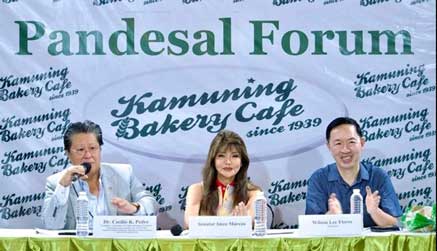Quezon City – Senator Imee Marcos and Federation of Filipino Chinese Chambers of Commerce and Industry, Inc. (FFCCCII) President Dr. Cecilio K. Pedro announced their ongoing P60 million typhoon Carina relief effort during their talk at the Pandesal Forum of the 85-year-old Kamuning Bakery Cafe. This relief effort, spearheaded by FFCCCII and Senator Imee Marcos, involves 30 major Filipino Chinese business, cultural, and civic organizations, providing aid to flooded and hard-hit areas of Metro Manila and nearby provinces such as Bulacan, Bataan, Pampanga, Tarlac, and Cavite. The eventual target is P100 million worth of donations for essential relief supplies like rice, canned sardines, and other necessities.
During the forum, Senator Marcos and Dr. Pedro congratulated gymnast Carlos Yulo for his unprecedented success in winning two Olympic gold medals in Paris, expressing high hopes that pole vault athlete EJ Obiena, boxers, and other athletes will also secure medals in the ongoing Olympiad. Dr. Pedro emphasized the importance of focusing on individual sports where height is not a crucial advantage, advocating for disciplines where the Philippines can excel globally, unlike basketball which has height requirements. Senator Marcos advised Carlos Yulo and other Filipino sports winners to manage and invest their prize money wisely, seeking good and honest advisers. She also urged the government to revive grassroots sports programs similar to the successful Gintong Alay project of her late father, President Ferdinand E. Marcos, which nurtured champions like Lydia de Vega and Elma Muros.
Senator Marcos, former Director-General of the Experimental Cinema of the Philippines (ECP), expressed her sadness over the August 4, 2024, passing of top movie producer Mother Lily Yu Monteverde. Dr. Pedro also eulogized Mother Lily and her late husband Remy Monteverde, recognizing them as respected philanthropists within the Filipino Chinese business community. Both Senator Marcos and Dr. Pedro lamented the August 3, 2024, death of FFCCCII Honorary President and philanthropist Dr. Henry Lim Bon Liong, known as the “Father of Philippine Hybrid Rice.” Dr. Lim was a strong advocate of Philippine economic self-reliance, agricultural self-sufficiency, and enhanced economic cooperation with China.
Addressing questions on foreign policy, Senator Marcos urged the government to uphold an independent and balanced approach similar to other ASEAN countries like Malaysia, Thailand, Vietnam, and Indonesia, which prioritize trade and economic cooperation. She emphasized the importance of the Philippines maintaining friendly relations with all global powers for economic and strategic benefits, avoiding involvement in power rivalries. She advocated for less aggressive rhetoric and actions regarding the West Philippine Sea tensions and for continuing diplomatic negotiations. Senator Marcos also stressed the need for national defense self-reliance and regional peace through ASEAN consultation and consensus.
On the need for railways, Senator Imee Marcos lamented that China has first offered their modern railway technology to the Philippines with the Northrail project started under then President Gloria Macapagal Arroyo but unfortunately this was not continued, while other ASEAN countries had benefitted from China-built modern trains like Indonesia’s Jakarta-Bandung high-speed rail, trains in Thailand and Laos. She pointed out that her home province Ilocos Norte would benefit, if the country and China can jointly build a modern train system across Luzon.
On the economy, Senator Marcos called for increased support for micro, small, and medium enterprises (MSMEs) and the promotion of local manufacturing to reduce reliance on Business Process Outsourcing (BPOs) and overseas Filipino workers (OFWs). Dr. Cecilio Pedro echoed these sentiments, urging improvements in ease of doing business and energy reforms to attract more foreign direct investments (FDIs), including the adoption of nuclear energy and other new technologies to lower high electric power rates.

